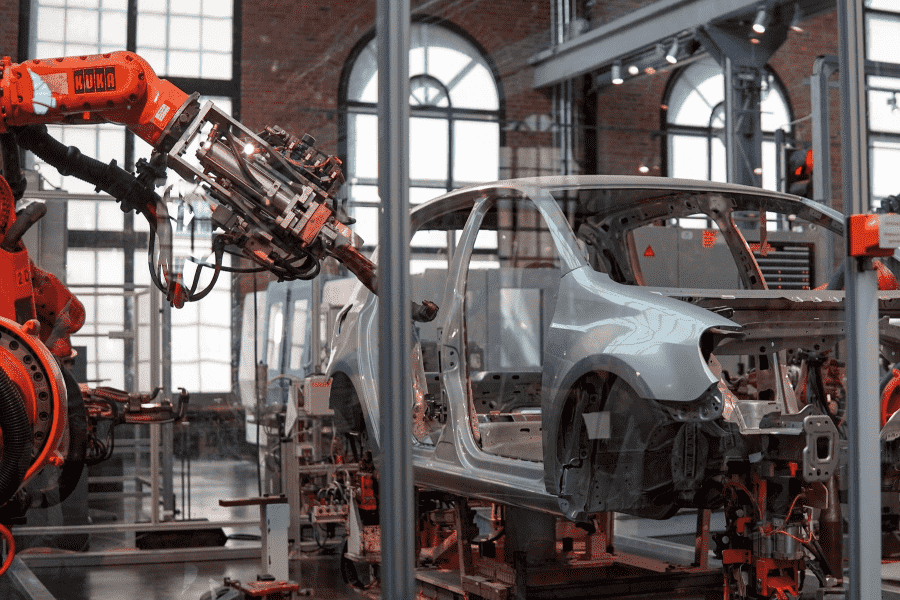YOUNG MAN:
That seminar yesterday on automation and the future of work was really good, wasn't it? Looking at the first industrial revolution in Britain in the 19th century and seeing how people reacted to massive change was a real eye-opener.
YOUNG WOMAN:
Yes. It was interesting to hear how people felt about automation then and what challenges they faced. I didn't know that first started with workers in the textile industry.
YOUNG MAN:
With those protesting workers called the Luddites destroying their knitting machines because they were so worried about losing their jobs.
YOUNG WOMAN:
Yes, and ultimately, they didn't achieve anything. And anyway, industrialisation created more jobs than it destroyed.
YOUNG MAN:
Yes, that's true – but it probably didn't seem a positive thing at the time. I can see why the Luddites felt so threatened.
YOUNG WOMAN:
I know. I'm sure I would have felt the same. The discussion about the future of work was really optimistic for a change. I like the idea that work won't involve doing boring, repetitive tasks, as robots will do all that. Normally, you only hear negative stuff about the future.
YOUNG MAN:
Bit too optimistic, don't you think? For example, I can't see how people are about to have more leisure time, when all the evidence shows people are spending longer than ever at work.
YOUNG WOMAN:
No – that's true. And what about lower unemployment? I'm not so sure about that.
YOUNG MAN:
Perhaps in the long term - but not in the foreseeable future.
YOUNG WOMAN:
Mmm. And I expect most people will be expected to work until they're much older – as everyone's living much longer.
YOUNG MAN:
That's already happening.
YOUNG WOMAN:
I enjoyed all that stuff on how technology has changed some jobs and how they're likely to change in the near future.
YOUNG MAN:
Yeah, incredible. Like accountants. You might think all the technological innovations would have put them out of a job, but in fact there are more of them than ever. They're still really in demand and have become far more efficient.
YOUNG WOMAN:
Right. That was amazing. Twenty times more accountants in this country compared to the 19th century.
YOUNG MAN:
I know. I'd never have thought that demand for hairdressing would have gone up so much in the last hundred years. One hairdresser for every 287 people now, compared to one for over 1,500.
YOUNG WOMAN:
Yeah because people's earning power has gone up so they can afford to spend more on personal services like that.
YOUNG MAN:
But technology hasn't changed the actual job that much.
YOUNG WOMAN:
No, they've got hairdryers, etc. but it's one job where you don't depend on a computer... The kind of work that administrative staff do has changed enormously, thanks to technology. Even 20 years ago there were secretaries doing dictation and typing.
YOUNG MAN:
Yes. Really boring compared to these days, when they're given much more responsibility and higher status.
YOUNG WOMAN:
Mmm. A lot of graduates go in for this kind of work now... I'd expected there to be a much bigger change in the number of agricultural workers in the 19th century. But the 1871 census showed that roughly 25% of the population worked on the land.
YOUNG MAN:
Yeah, I'd have assumed it would be more than 50%. Now it's less than 0.2%.
YOUNG WOMAN:
What about care workers?
YOUNG MAN:
They barely existed in the 19th century as people's lifespan was so much shorter. But now of course this sector will see huge growth.
YOUNG WOMAN:
Yeah – and it's hard enough to meet current demand. The future looks quite bleak for bank clerks. They've been in decline since ATMs were introduced in the eighties.
YOUNG MAN:
And technology will certainly make most of the jobs they do now redundant, I think.
YOUNG WOMAN:
I agree, although the situation may change. It's very hard to predict what will happen.
 Thông tin mình cần nghe "Học sinh bày tỏ 2 Ý KIẾN nào về Luddites"
Thông tin mình cần nghe "Học sinh bày tỏ 2 Ý KIẾN nào về Luddites" Biết sắp có thông tin "With those protesting workers called the Luddites destroying their knitting machines because they were so worried about losing their jobs."
Biết sắp có thông tin "With those protesting workers called the Luddites destroying their knitting machines because they were so worried about losing their jobs." Nghe được "Yes, and ultimately, they didn't achieve anything. And anyway, industrialisation created more jobs than it destroyed."
Mình có: destroying their knitting machines + they didn't achieve anything >> phá máy dệt + họ (Luddites) chẳng nhận được gì.
= A. Their actions were ineffective.
Nghe được "Yes, and ultimately, they didn't achieve anything. And anyway, industrialisation created more jobs than it destroyed."
Mình có: destroying their knitting machines + they didn't achieve anything >> phá máy dệt + họ (Luddites) chẳng nhận được gì.
= A. Their actions were ineffective.  Đáp án: A
Đáp án: A

